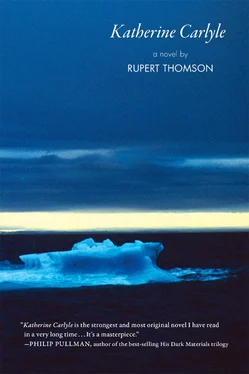“So that will be my reward,” Zhenya says matter-of-factly, and without a trace of sarcasm. “To hear your story.”
“It’s a long story. I’m not sure how to tell it yet.”
“Does it have an end?”
“No. But it has two beginnings.”
“A story with two beginnings and no end.” She looks beyond me, into the library, where all the books sit undisturbed. “That’s something new.”
Her dry delivery makes me laugh. “You’re very funny, Zhenya.”
“Really? No one’s ever told me that.”
“It’s true.”
“My husband doesn’t think I’m funny.”
“Well, he’s wrong.”
She takes her cup over to the sink and stands with her back to me for a few moments, not doing anything, and I worry that I might have caused offense. Then she looks at me, over her shoulder. “I feel better. Thank you.”
I finish my tea and join her at the sink.
“Guess what I saw last night,” I say.
/
Winter grips. Satellite images show the town from above, blurred, buried, close to being obliterated by whiteness. A southeasterly rushes between the buildings, shrill and relentless, and the cloud cover is dense and low. I ask Zhenya if the wind has a name. In most countries, I tell her, winds have names. Chinook, meltemi. Tramontana . Maybe it does, Zhenya says, but she isn’t aware of it. The streets are deserted except for when the miners return from their shifts, lights shining on the front of their orange helmets, faces wrapped in scarves or balaclavas. The temperature has plummeted twenty degrees since my arrival, though the wind-chill factor makes it feel more like thirty. In the evenings I make endless cups of tea and coffee and sit in bed with my hot-water bottle, learning Russian or listening to the radio. If Bohdan’s keeping vigil in the corridor I haven’t heard him.
On the first Saturday in December I arrange to have dinner in the bar of the hotel. It’s an extravagance — I will have to pay in Norwegian kroner, like a tourist — but I’m tired of cooking for myself and I feel like a change from the canteen. That night, as I pass the half-open door to the kitchen, Ivonna looks round. We say good evening to each other, but Ivonna’s expression is neutral, as always. Everything is the same as I remember it — the dark-red tablecloths, the pine-clad walls that gleam like glass, the vodka and Toblerone behind the bar. What I’m unprepared for is the presence of two middle-aged men, seated where the doctor used to sit. One of them is balding, with a beard. The other has fair hair and pink cheeks. They’re deep in conversation, though they fall silent and look round when I walk in. My old table is set up for me, with three or four pirozhki, some sliced white bread, and a jug of processed apple juice. As soon as I sit down Ivonna brings the hot part of the meal — a small plate of cannelloni and a piece of grilled meat.
Later, when I’m standing by the electric kettle, waiting for it to boil, the man with the beard asks if I’d like to join them. They are scientists, he says. From Denmark. I thank him, then introduce myself and take a seat.
The fair-haired man pours me a vodka. “You’re American?”
“No, English.”
“Bottoms up!” He raises his glass. “That’s what you say in English, no?”
“Not very often,” I tell him. “Usually we just say ‘Cheers.’ ”
“Oh.” He smiles ruefully, then drinks.
“But it’s not wrong,” I say.
The man with the beard tells me he works as a botanist. The two men have been to Svalbard on many occasions, though this is their first visit to Ugolgrad. I’m surprised to see them, I say, transport being virtually nonexistent at this time of year. They were lucky, the bearded man tells me. Their university contacts in Longyearbyen managed to secure them a lift on the Russian helicopter. They are regular visitors to Ny-Ålesund, he goes on, the scientific community that acts as a center for research into climate change. I ask if it’s true that the Norwegian government have built a doomsday vault on Svalbard.
The fair-haired man breaks in. “It’s near the airport. You didn’t see it?”
I shake my head. “I didn’t know it was there.”
“That’s a shame. It’s beautiful.”
Since the materials used in the top half of the vault include mirrors, stainless steel, and prisms, he tells me, it reflects light throughout the summer, acting as a kind of beacon or focal point in an otherwise bleak landscape. In the winter it’s even more spectacular. A network of two hundred fiber-optic cables means it gives off a constant, muted white-and-turquoise glow. A Norwegian artist by the name of Sanne designed the installation.
The botanist takes over. Svalbard was chosen for the project on account of its comparative security, he says. Permafrost is one factor, but the absence of tectonic activity is also significant. The vault itself is located 130 meters above sea level, in the side of a sandstone mountain. Even if the polar ice cap were to melt, the site would remain dry. Locally mined coal provides power for the refrigeration units that cool the crop seeds to the recommended minus 18 Celsius. Four and half million seeds will eventually be stored inside the vault, to be used in the event of global catastrophe.
He hesitates. “You’re smiling.”
What he’s saying reminds me of my own origins. He might almost be describing me.
“Sorry,” I say. “I was thinking about something else.”
Worried that he’s boring me, perhaps, he changes the subject. The flora is astonishingly varied on Svalbard, he tells me, partly due to the warming influence of the Gulf Stream, and partly on account of the seabird colonies, which provide natural fertilizers. Roughly a quarter of the flowering plants are completely unknown in Scandinavia. There are twelve different species of whitlow grasses, for instance, though he has only ever spotted seven. The fair-haired man interrupts. He works as a marine biologist, he says, but his real passion is bird-watching. On Svalbard you can see king eider ducks, gray phalaropes, and fulmars. You have to be careful with fulmars. If you encroach on their territory they spit a rancid liquid at you.
The two men are enthusiasts, and eager to share their knowledge, but after a while, inevitably, the conversation shifts. They are amazed to find someone like me in such a remote place, especially at such an inhospitable time of year. They couldn’t quite believe it when I walked into the bar. Am I alone? Surely not.
I tell them I have come to Svalbard for the peace and quiet.
“Peace and quiet?” the botanist says. “That is — how do you call it in English? — an understatement, no?”
The two Danes are laughing. They’re both a little drunk. The marine biologist is curious to know how I spend my days.
“I work as a cleaner,” I say, “and I’m learning Russian in my spare time. I’m keeping a journal too.” I talk about my drawings of abandoned interiors. The pink house near the quay, the old canteen. “Now it’s dark all the time, though, I’ve started writing.”
The botanist exchanges a look with his colleague. “We must be interesting. Then she will write about us.”
“I’ll write about you anyway,” I say.
The two men find this very funny.
“Ah yes,” the botanist says, shaking his head. “The English humor.”
The marine biologist lifts the vodka bottle. “Another drink?”
I thank the men for their company, but plead tiredness and rise out of my chair.
“Can we walk you home?” the botanist says.
“That’s very kind,” I say, “but there’s no need. It’s really close.”
Outside, the night is so cold that breathing is difficult. My throat and lungs feel scoured by the air. I tip my head back and the sky towers above me, layer on layer of blackness. The moon is a round hole, small and brilliant. Light streams through it from another, brighter world.
Читать дальше












